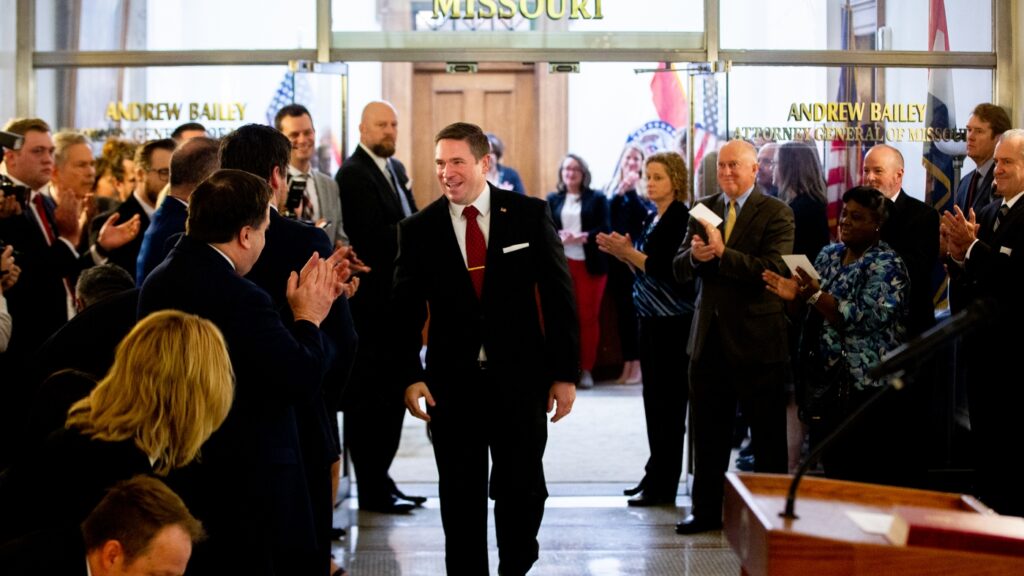Andrew Bailey as he took office as Missouri state attorney general in January, 2023.
Brian Munoz/St. Louis Public Radio
hide caption
toggle caption
Brian Munoz/St. Louis Public Radio
In under three years, Missouri Attorney General Andrew Bailey built a track record for using his office to oppose abortion even though voters supported it, filing lawsuits on culture-war issues and defending Donald Trump.
Bailey was named a couple weeks ago to be a co-deputy director at the FBI and is expected to take office Monday. “My life has been defined by a call to service, and I am once again answering that call, this time at the national level,” he said in accepting the post. He resigns his state position effective Monday.
He’ll be stepping into the FBI as it faces heavy turnover under President Trump and Attorney General Pam Bondi. The agency faces accusations by Democrats of abusing its powers to punish Trump opponents and even some Republicans say it has mishandled information about the case of convicted trafficker Jeffrey Epstein.
A decorated Iraq war veteran, the 44-year-old Bailey saw a fast political rise including roles as a prosecutor and as a counsel to a Republican governor. He was appointed attorney general in 2023 and won re-election in 2024.
A fast rise and quick attention
Early in office Bailey took on local elected officials, trying to oust St. Louis Circuit Attorney Kim Gardner for mismanagement — Gardner resigned — and St. Louis Sheriff Alfred Montgomery from office, an effort that’s still pending.
Bailey also gained nationwide attention when he sued Starbucks and IBM for their racial diversity initiatives. He assisted Elon Musk in his legal campaign against Media Matters, a left-of-center media watchdog group that was critical of Musk’s stewardship of X.
He sued the state of New York after a jury there convicted Trump of falsifying business records. He alleged that the state was engaging in election interference against Missouri.
Saint Louis University law professor Anders Walker said Bailey had a knack for finding issues that resonated with Missouri’s conservative voters.

Andrew Bailey is sworn into office as Missouri attorney general in 2023.
Brian Munoz/St. Louis Public Radio
hide caption
toggle caption
Brian Munoz/St. Louis Public Radio
“Certainly with the power of the federal government, he could pick up some of those issues, conduct investigations, use his new law enforcement capabilities to dig up dirt stories on issues he’s already done,” Walker said.
Bailey, usually genial with the media, declined an interview through his state office.
Bailey fought against legalizing abortion in Missouri even after voters approved it
After the U.S. Supreme Court overturned the federal right to abortion in 2022 Missouri imposed one of the strictest bans in the country, leading to a voter effort to legalize it.
Bailey argued legalizing abortion would cost the state lost revenue in hypothetical taxes on people who would not be born. Missouri’s Supreme Court ruled against including that note on the ballot.
“That’s a perfect encapsulation of where politics has gone in the Trump era,” said Democratic state Sen. Stephen Webber. “It’s completely legitimate to have policy disagreements and to have policy debates, but they need to be grounded in something. And that fiscal note wasn’t grounded in anything. It was purely performative.”
After voters legalized abortion, Bailey tried to require the enforcement of some laws remaining on the books that would have made it almost inaccessible.
“His entire goal here was to sow confusion, to overturn the will of the people and to not protect those who are most vulnerable,” said Margot Riphagen, the CEO and president of St. Louis-based Planned Parenthood Great Rivers Action. “So when I think about what’s going to happen on a national scale, it’s going to be, you know, 10 times worse. It’s going to be exactly more of the same nationally.”
A high school moment: “I like to break things”
Former Senate President Pro Tem Caleb Rowden, a Republican, met Bailey when the future attorney general was still in law school. He said he found Bailey to be a “likeable person” who was willing to converse with his political opponents.
“In today’s era where you do have to, I think, in positions like that yell a little bit louder at times, maybe than you want to, it’s good to still be a likable human being and a genuine human being, which I think most people think he is,” Rowden said.
Webber, the Democratic state senator, first met Bailey when he was a teenager and they crossed paths in the high school debate circuit. He recalls when Bailey was asked whether he preferred to be on the affirmative or negative side of an argument.
“A lot of kids like affirmative because you have your case written out and it’s easier,” Webber said. “And Andrew Bailey said, ‘I like negative,’ and then he paused and said: ‘Because I like to break things.'”
Jason Rosenbaum covers politics for St. Louis Public Radio.

